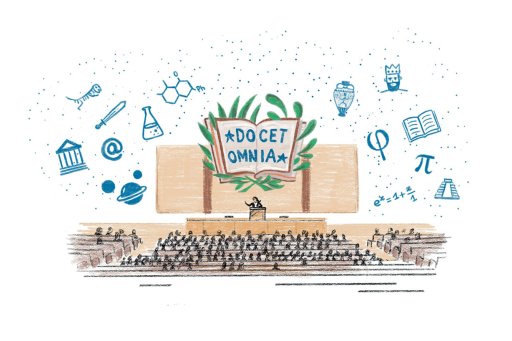The Covid19 pandemic is undoubtedly not of climatic origin, even if we are not yet certain about any environmental changes that may have brought the populations of host animals (bats and pangolins) closer to man. Nonetheless, the current epidemic is a sobering reminder for climatologists, as it prefigures the accelerated spread of global warming predicted for the coming decades. The crisis caused by the coronavirus is a kind of dress rehearsal, a crash test, for human societies.
Of course, the climate wave has a longer duration than that of Covid19, but we see the same individual and collective reactions to risk and adversity, with reflexes of incredulity, stupefaction or panic. At the start of a crisis, some people cast doubt on the importance of the problem, questioning the word of scientific experts on highly complex subjects. Scientific groping and jousting add to the confusion in the minds of the public and decision-makers, and feed the blogosphere and social networks with their outbursts.
Both types of crisis also call into question forecasts based on mathematical models, which are the best way to project quantitatively into the future. The most extreme take the opportunity to propagate conspiracy theories in search of scapegoats.
Maximum impact on the poorest
Beyond these caricatures, the epidemic and climate crises show very real and unfortunate similarities for human populations. The current health crisis will have the greatest impact on the poorest people on an international scale, as well as within the population of a single country. Even if the spread of the disease in Africa is lagging behind that of other continents, we can see a human tragedy looming for those who do not have the means to protect and treat themselves. Some worry that the virus will persist in certain regions, forming permanent reservoirs ready to feed epidemic outbreaks.
Climate change is also having the greatest impact on poor populations. Recent trends in precipitation are much more contrasted on a regional scale than those in temperature, and climate models predict a widening of regional precipitation contrasts. Warming and declining water resources (including "virtual" water linked to food imports) will have a catastrophic effect on the most deprived nations, often dependent on precarious agriculture to feed populations sensitive to any additional disruption, such as epidemics.
The Covid19 crisis and climate change clearly demonstrate the amplification of regional impacts by human movements and the globalization of trade. A double illustration is provided by the links between climate and epidemics in the past. For example, recent research shows that plague contamination is modulated by climate in Central Asia, which affects populations of large gerbils and fleas, vectors of the Yersinia pestis bacterium.
A major epidemic, which arrived from India in the mid-6th century, spread throughout the Roman Empire, due to the intensity of its trade. This so-called "Justinian plague", named after the emperor of the time, was followed by some fifteen other outbreaks of the disease, until the 8th century. These epidemics were superimposed on the more direct impacts of the climatic degradation known as the "Little Ice Age of Late Antiquity" [from the end of the 3rd century to the beginning of the 8th century], which followed the Roman climatic optimum [from the 3rd century BC to the 3rd century AD]. Although simplistic determinism must be avoided, it appears that these disorders added their impact to other societal troubles of a declining Roman Empire.
The Black Death of 1347 and the multiple reintroductions of the Yersinia pestis bacterium that followed may also have been climatically determined in Central Asia, linked to the Little Ice Age period, commonly dated between the 13th and 19th centuries. Closer to our own time, we know that the cholera epidemic that began in 1816 in the Bengal delta is linked to the impact of the eruption of the Tambora volcano in 1815 [on the island of Sumbawa, Indonesia]. This highly explosive eruption generated sulfur aerosols that were disseminated for several years in the stratosphere, leading to a general cooling of the lower atmosphere, particularly marked during the "year without summer" that followed. A sharp drop in the Asian monsoon brought famine linked to poor harvests. The cholera epidemic, confined to a limited but densely populated area, then spread to other regions through the commercial exchanges of a nascent globalization. Further outbreaks of cholera occurred in the 19th century, in a veritable pandemic affecting all continents, from Asia to Europe to America.
The coronavirus and global warming illustrate the absolute necessity of international consultation and cooperation to provide mutual medical and economic assistance, and to find lasting solutions - vaccines and curative treatments, reductions inCO2 emissions and the transition to a sustainable economy. If we don't, we'll all lose out in the longer or shorter term, even if some countries will be less affected than others for the time being. National economies cannot "confine themselves" to a global slump, nor can they isolate themselves from the effects of climate change
from the effects of climate change.
Learning from history
The history of climate and human societies includes other lessons we should ponder. Great civilizations of the past, sophisticated and hierarchical - such as the Mayas, the Indus Valley civilization, the Akkad Empire in Mesopotamia, Imperial China or the Khmer kingdom - were severely affected by climatic variations. The resulting unrest was often amplified by human reactions, culminating in war or the abandonment of urban, political and religious centers.
One would hope that today's societies would be wiser. Our scientific and technical knowledge is incommensurable with that of these ancient civilizations. Nevertheless, previous troubles were confined to regions affected by natural climate change, often amplified locally. In the case of current warming, this is a global climate forcing, mainly caused by the increased greenhouse effect of anthropogenicCO2. The problem is further exacerbated by the increasing connectivity of human societies over the course of history, reaching its zenith today with international stock market orders given in fractions of a second. The current crisis shows that our modern societies are probably no more reasonable than their predecessors. Each country adopts its own selfish solutions with different strategies, based on a compromise between safeguarding its market economy and preserving its health and environment. In this respect, the difficulties and chronic indebtedness of poor countries constitute a time bomb for these global problems.
At the very least, we should expect industrialized countries to cooperate in exchanging information on the extent of the problems and on technological solutions to repair or counter them. Instead, we are witnessing one-upmanship between countries over figures and scientific advances.
Unilateralism still seems to have a bright future ahead of it, whereas solutions should be sought on a global scale and the role of supranational coordination bodies strengthened. It's easy to criticize international institutions, which often have very little funding compared to state structures, and no means of coercion to enforce national laws or commitments. It's hardly surprising, then, that multilateralism has come under attack on numerous occasions, such as the United States' 2017 withdrawal from the Paris climate agreement, which grew out of the UN Climate Change Conference (COP21), and Donald Trump's recent decision to financially disengage his country from the World Health Organization (WHO), an agency also dependent on the United Nations. Breaking the thermometer is no solution to global warming or to current and future pandemics.









